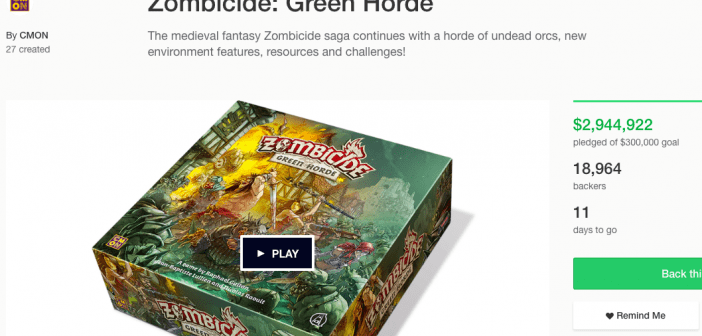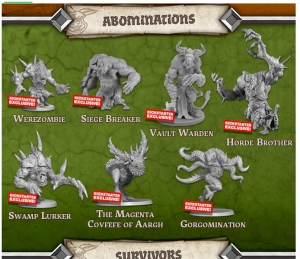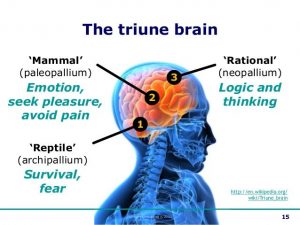CMON is at it again. Zombicide: Green Horde has laid claim to our wallets, coming hot on the heels of a $4.2 million campaign for Rising Sun earlier in the year, a $3.6 campaign for Massive Darkness last June, and… well, you get the idea. CMON has used Kickstarter to grow exponentially over the last few years. With healthy kickstarters, a (mostly) happy community, and Eric Lang in full-time tow, CMON represents a real success story in the gaming industry.
All would be well and good, except for two magic words that appear in all of their projects:
Just to look at the most recent example, your pledge towards Zombicide: Green Horde will net you exclusive heroes, villains, custom dice, a giant dragon mini, and all sorts of cool stuff. Personally, I’m drawn to the bad guy minis (my history as a D&D DM coming through there), so here’s one brief example that caught my eye while perusing the campaign page:
Look at all of this cool stuff! Cool stuff, mind you, that I will never own. I’m not backing Z:GH. Because of that, I’m choosing to shut myself out.
Anthony and I elaborated our unhappiness when we reviewed Masmorra and The Others on one of our podcast episodes. However, I feel we could have gone much further in our analysis. I’d like to take another stab at explaining why I think kickstarters exclusives are ultimately bad for gamers and bad for the community as a whole.
The Rational Angle
If I want these awesome toys, all I need to do is back it, right? If I choose not to back it (which is true), then I’ve made a rational decision to miss out. On the flip side, close to 19,000 backers (as of this writing) have made the rational decision not to miss out. The continuing success of CMON kickstarters speaks for itself in terms of a CMON’s customer’s satisfaction level. If they thought something hinky was going on, they’d vote with their wallets.
However, I can’t think of a more rational thing to do before a purchase, any purchase, than to try the thing out. I can’t do that with a kickstarter. You can make the argument that the Zombicide franchise has built up enough trust and credibility in the community to justify a purchase, sight unseen. The same is true for any Eric Lang game; he hasn’t made many bad ones recently.
However, you still don’t know.
The only sources of information about the game come from the producers themselves and those who were paid (in money, free games/ merch, or all of the above) to provide coverage. Z:GH could just be a rehash of the same old thing. It could be worse. You don’t know. Thousands of people spending millions of dollars on a product that has not been and cannot been touched by anyone without an interest in selling the game? That doesn’t sound rational to me. Something else is going on.
The Emotional Angle – Happiness
Every advertiser knows that the best way to sell something is to hook into a customer’s emotions as well as their intellect. “Emotions process sensory input in only one fifth the time of our conscious, cognitive brain takes to assimilate the same input” is how one blog puts it. By the time our thinking mind wraps around something, our emotions have already processed, decided, and acted upon it!
And another: “Emotions are the substrate, the base layer of neural circuitry underpinning even rational deliberation. Emotions don’t hinder decisions. They constitute the foundation on which they’re made!” So much of our decision-making, way more that we like to admit, stems from our emotions.
Ok, so which emotions? Advertisers like to point to six universal emotions that have been effective in motivating action: happiness, anger, disgust, sadness, fear, and surprise. I’m going to pick out two of them to talk about. First, happiness. Advertising in the gaming community likes to emphasize happiness and fun. Of course! We’re selling games, after all, right?
Jamey Stegmaier, in his awesome kickstarter blog, points out that kickstarters must go an extra mile in building customer happiness. As mentioned above, the buyer doesn’t have a product that they can touch, see, feel, or test. Kickstarters must build good communities around them that make people happy. Kickstarter backers don’t only buy a product. They invest in a creator and a community. Both need to keep the backer feeling connected and happy. Even if the community has unhappy people in it (it’s the internet, after all), the community itself need to be able to respond and keep things copacetic.
CMON clearly has its detractors in their comments sections, on BGG, etc. However, on the whole, people seem happy with their products and trusting of the company. For anyone who express unhappiness, enough gamers step in to defend CMON and talk about how fun their games are.
The Emotional/ Biological Angle – Fear
Happiness is a great emotion, which sure does motivate a lot of action. However, fear is a deeper emotion and motivates quicker, more decisive action. We strongly considee purchases with our reason. We spend more than we might want out of happiness. But we clean the shelves with our fear. I ripped this from a recent headline to illustrate.
The reason is in our evolution and our biologies.
As humans, we don’t have one brain; we have three.
(Most of the time, they work in relative harmony with one another. Therefore, we don’t notice we have three completely different systems running the collection of processes we call a “brain”. But that’s only most of the time. Describing all that would take us way to far afield.)
We have our “rational brain,” which governs higher level thinking, judgment, weighing consequences, etc. From an evolutionary perspective, our rational brains are fairly new. Therefore, it can be a bit slow with certain things. Or, at least, slower than our “mammal brains”, which are a bit older and deeper in the head. Our mammal brains govern our attachments, loves, cares, etc. When we talk about communities and how good they make us feel, we’re at this level.
Our “lizard brains” reside at the deepest levels, biologically speaking. It doesn’t get much deeper than our brain stems. Our “fight or flight” impulses come from here, which is really a fear impulse. Fear keeps us away from danger, so we can’t say it’s bad. We literally, as a species, wouldn’t be here without it.
However, because of the way we are built, fear makes us vulnerable to the best marketers. If a marketing pitch can successfully get us to be afraid of something, we will buy it faster than stuff that makes rational sense, or that makes us happy, etc.
Here is a good list of ways in which advertisers have used fear in smart ways (along with some dumb ways, just for the lols). To be sure, fear has proven ineffective as a long term, consistent strategy for a single product or product line. However, done properly, the best advertising finds ways to tickle our deep, evolutionarily ingrained fear impulses while also inspiring other, more positive emotions as well.
CMON and FOMO
Still with me? Probably not. This post is too long. I don’t really care, though, because I needed to lay all of this track in order to get to the point that I’ve always wanted to make about CMON and kickstarter exclusives. Basically, CMON’s exclusives tug at our emotional and neurological fear centers in subtle but real ways, leading us to 1) make purchases that we wouldn’t otherwise and 2) to rationalizing and justifying those purchases after the fact to save face.
I know what you might be thinking. What does an evolutionary impulse designed to hide us from sabertooth tigers have to do with making sure we get that cool, exclusive dragon sculpt? Easy: fear is fear. Our lizard brain is too primitive to distinguish among fears. It is designed that way, because fear needs to drive immediate action. Distinguishing among fears is the job of our higher functioning. But sometimes, the mammal and the rational don’t get there in time. Once our lizard brains make a decision that we have to have something, we go for it.
The idea of missing out on a kickstarter exclusive triggers a number of different kinds of fear. We might feel social fear, for example. When we get the game to the table, we don’t want to explain to our friends why they are being presented with an “inferior” version of the game. We also feel a more personal fear. Many of us are bad at experiencing uncomfortable emotions like jealousy (at someone who backed the kickstarter), injured pride (at tolerating the inferior product), and the like. We will pay to avoid it.
How many of us look at our retail box of Blood Rage and wish we had those cool extra monsters that were in the kickstarter? Sure, the game works fine without those extras. But someone else’s game works better, simply because of increased variety and coolness factor. That hits all sorts of emotional buttons for many of us, to the point where it’s just easier to hit pledge than go through all of that.
I could understand the situation of an individual designer or small company. They might put out a limited edition of a game to get attention, yet external factors prevent them mass producing that content after the fact. However, CMON is not a small company. They could easily mass produce any of their exclusives. Instead, they choose to generate fake scarcity in order to increase the buzz around their kickstarters.
By “buzz”, I hope I have been clear that I mean exactly the kind of emotional surge, tinged with brain stem-triggering FOMO, that I contend leads to CMON’s train of multi-million dollar campaigns.
Of course, none of us wants to admit that we bought a kickstarter because of fear and shame. We want to be able to say we spent money because of our free choice, or for some kind of positive emotional reason. For many, that might be true. The only way to assess motivation one way or the other would be to send out some kind of anonymous survey (literally faceless, so no need to save any face). That is way beyond the scope of my little blog. However, I’m willing to bet money that responses like “I don’t want to be that guy who doesn’t have all the cool minis” or “I was afraid of getting stuck with a crappy retail version” would outscore more positive motivations.
A plea to CMON: Please Stop
At the end of the day, this practice will go on. It’s too lucrative. It’s also too easy for defenders of this practice to handwave all of this psychological mumbo-jumbo and fall back on the whole ‘people will buy what they want’ line. That’s fair enough. I don’t want to sit here and accuse 19,000 people of being swayed by their fear. However, on a personal level, I react very strongly to fear marketing when I see it. I feel it’s manipulative and predatory. It introduces dynamics into the gamer community that cause division and negative emotions. We play games to get away from all that.
So CMON, please stop. Sell complete copies of your games as kickstarters and at retail. Or, at the very least, try it once and see what happens.








Show Comments